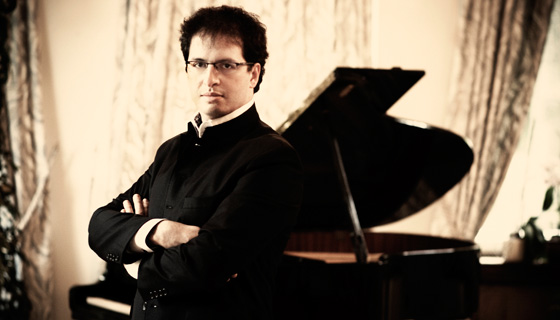By Stephen Brookes • The Washington Post • February 11, 2013
It’s probably a good idea to get out of Marouan Benabdallah’s way when he sits down to play Bartok. The young Moroccan pianist has a powerful, even ferocious technique, and — as he proved at the Phillips Collection on Sunday afternoon — takes an almost palpable joy in the driving rhythms and biting, aggressive harmonies of Bartok’s music. The whole first half of the program, in fact, was devoted to the Hungarian composer, from five of the edgy-but-beguiling “Mikrokosmos” etudes (played with incisiveness and color to spare) and the early Elegy, Op.8b, No. 2 (lush to an almost Lisztian degree), to the jaunty, anything-goes Scherzo from the youthful “Four Piano Pieces” — all brought off with a kind of exuberant wildness and virtually perfect control. Benabdallah’s mother is Hungarian, which perhaps accounts for some of his his natural way with Bartok. But he proved equally adept at the far different music of Debussy, retracting his claws to bring a lighter (if distinctly dry-eyed) touch to three of the “Images” from 1907. These works — particularly the shimmering “Poissons d’or” — are often played for their impressionistic, atmospheric effects, but Benabdallah managed to bring out their delicate poetry while keeping everything in sharp focus.
Benabdallah’s mother is Hungarian, which perhaps accounts for some of his his natural way with Bartok. But he proved equally adept at the far different music of Debussy, retracting his claws to bring a lighter (if distinctly dry-eyed) touch to three of the “Images” from 1907. These works — particularly the shimmering “Poissons d’or” — are often played for their impressionistic, atmospheric effects, but Benabdallah managed to bring out their delicate poetry while keeping everything in sharp focus.
Two short sonatas rounded out the afternoon: the robust and engagingly lyrical “Sonata Breve” by the contemporary Argentinian composer Maximo Flugelman and Scriabin’s two-movement Sonata in F-sharp Major, Op.30, No.4, from 1903. Depending on the bent of your ears, Scriabin was either a mystical genius or a tedious blowhard (the jury may be forever out), but Benabdallah’s incisive, finely drawn approach made the work bearable even to skeptics.
Part of what made the afternoon so enjoyable, it should briefly be noted, was a new configuration of the Phillips’s venerable Music Room. It has never been an ideal place for chamber music, with the “stage” area divided from the audience by columns that form a sort of psychological barrier. But Benabdallah played in the main part of the room, with the audience in a semicircle around him, creating a more intimate, relaxed and pleasantly communal experience. Audience reaction seemed very positive; this vote, for one, goes for making the new setup permanent.